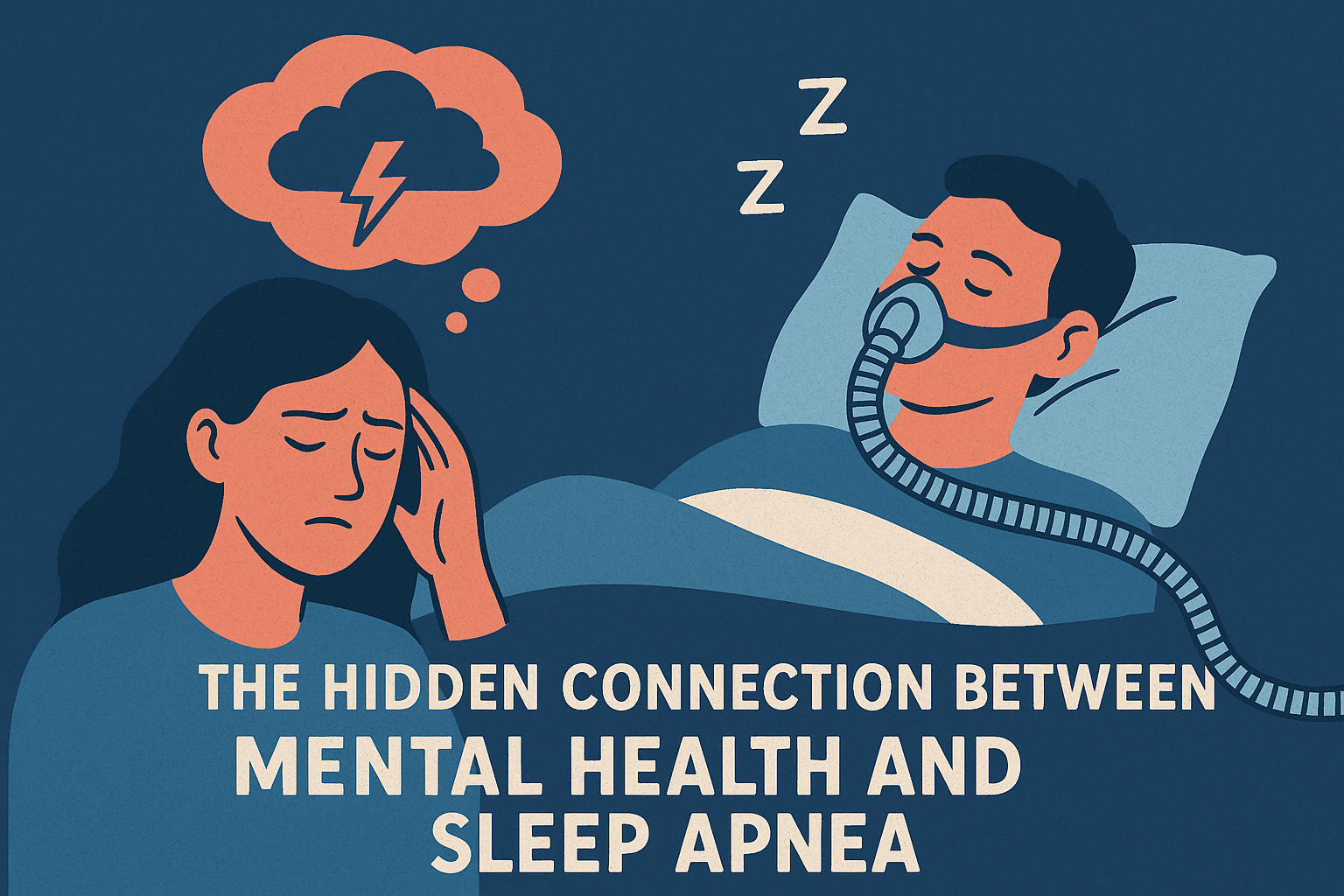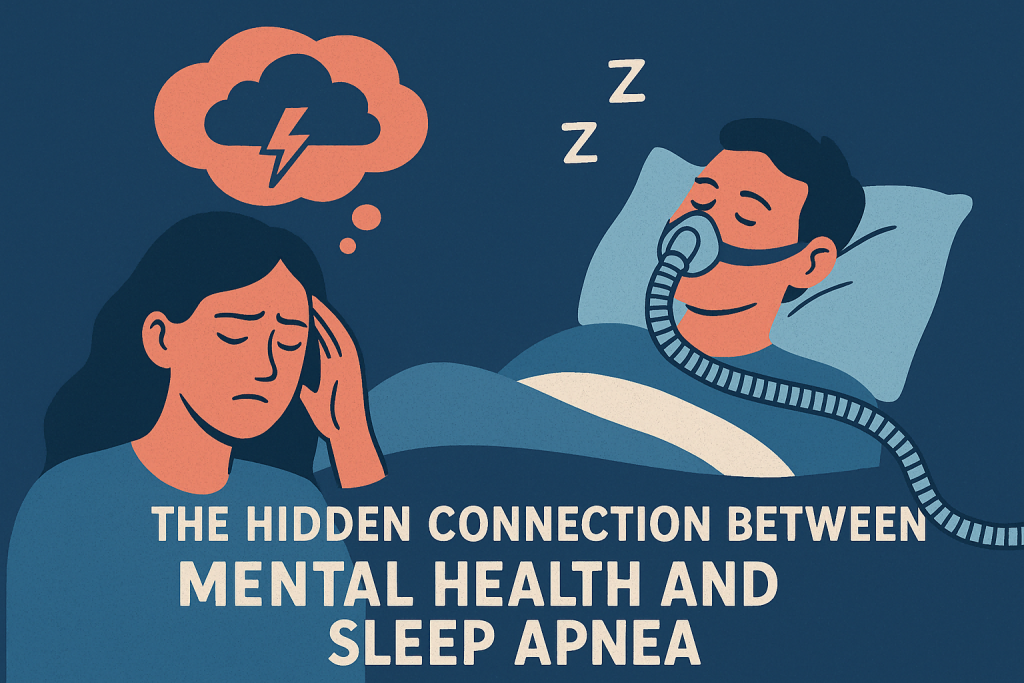The Hidden Connection Between Mental Health and Sleep Apnea


Why Mental Health and Sleep Apnea Are More Connected Than You Think
Mental health and sleep are two sides of the same coin. When one suffers, the other follows closely behind. For millions worldwide, sleep apnea—a disorder that causes repeated breathing interruptions during sleep—is silently eroding mental well-being. While snoring and daytime fatigue are often the most recognized symptoms, the hidden psychological toll is frequently overlooked.
Recent studies reveal that individuals with sleep apnea are significantly more likely to experience depression, anxiety, and mood instability. The brain, deprived of oxygen and fragmented rest, struggles to regulate emotions effectively. The result? A vicious cycle where poor sleep amplifies mental distress, which in turn worsens sleep quality.
Understanding this intricate relationship is key to addressing not just the symptoms but the root causes of both sleep and emotional imbalances. Let’s explore what really happens when the mind and body fail to rest together.
Understanding Sleep Apnea and Its Types
What Is Sleep Apnea?
Sleep apnea is a chronic condition where breathing repeatedly stops and starts during sleep. These pauses—called apneas—can occur dozens or even hundreds of times each night, reducing oxygen levels in the blood and disrupting deep sleep cycles.
The Main Types: Obstructive, Central, and Complex Sleep Apnea
- Obstructive Sleep Apnea (OSA): The most common type, caused by airway blockage during sleep, often from relaxed throat muscles.
- Central Sleep Apnea (CSA): Stemming from the brain’s failure to send proper breathing signals to the muscles.
- Complex Sleep Apnea: A combination of both, requiring specialized medical attention.
Common Symptoms and Warning Signs
Symptoms go beyond loud snoring or waking up gasping for air. Many people report:
- Morning headaches and dry mouth
- Persistent fatigue despite long sleep hours
- Mood swings, irritability, and difficulty concentrating
- Memory issues and decreased motivation
When ignored, these signs can lead to long-term cognitive decline and emotional instability.
The Science Behind the Brain-Sleep Relationship
How Sleep Quality Impacts Brain Function and Mood
Sleep is when the brain repairs itself, consolidates memories, and resets emotional balance. Fragmented sleep, such as that seen in sleep apnea, interferes with these processes. The result is cognitive fog, low mood, and impaired stress response.
The Role of REM Sleep in Emotional Regulation
REM (Rapid Eye Movement) sleep is the phase where dreams occur and emotional processing takes place. Interruptions during this stage prevent the brain from effectively managing fear, anxiety, and stress, often worsening mood disorders.
Cortisol, Serotonin, and the Sleep Cycle Connection
Chronic sleep deprivation elevates cortisol, the body’s main stress hormone, while lowering serotonin, which regulates happiness and calm. This hormonal imbalance directly contributes to anxiety, irritability, and depression—core components of poor mental health.
The Psychological Toll of Sleep Apnea
Anxiety and Depression in Sleep Apnea Patients
A growing body of research links untreated sleep apnea to heightened risks of major depressive disorder and generalized anxiety. Oxygen deprivation affects neurotransmitter balance, making it harder to maintain stable emotions.
The Impact on Stress Levels and Cognitive Health
Sleep apnea disrupts the body’s natural stress regulation systems. Over time, this chronic stress contributes to reduced focus, decision-making challenges, and emotional exhaustion.
Emotional Dysregulation and Fatigue: A Vicious Cycle
When exhaustion takes over, emotional resilience plummets. Small frustrations become overwhelming, and coping mechanisms fail. This creates a cycle where mental fatigue leads to sleeplessness, and sleeplessness fuels further emotional turmoil.
How Mental Health Disorders Can Worsen Sleep Apnea
The Role of Anxiety, PTSD, and Chronic Stress
Anxiety, post-traumatic stress disorder (PTSD), and chronic stress all profoundly affect breathing patterns, especially during rest. When the mind remains in a constant state of alertness—what experts call “hyperarousal”—it prevents the body from entering deep, restorative sleep stages. This tension tightens throat muscles and elevates heart rate, making airway obstruction more likely during the night.
PTSD sufferers, in particular, often experience night terrors and fragmented sleep, conditions that align closely with undiagnosed sleep apnea. The repeated oxygen dips can trigger panic-like awakenings, reinforcing anxiety the next day. It becomes a loop where emotional trauma feeds physical symptoms and vice versa.
Medications and Sleep Patterns: What You Should Know
Certain antidepressants, antipsychotics, and anxiety medications—while essential for mental health management—can also alter sleep architecture. Some suppress REM sleep or relax throat muscles, increasing the likelihood of apnea events. This doesn’t mean one should stop taking prescribed medication; rather, it underscores the importance of coordination between psychiatrists and sleep specialists for holistic care.
The Bi-Directional Relationship Between the Mind and Breathing Patterns
Just as mental health affects sleep apnea, untreated apnea can worsen mental disorders. Oxygen deprivation at night changes the way the brain regulates mood, memory, and impulse control. Over time, this can intensify pre-existing conditions like depression, bipolar disorder, or panic attacks. Recognizing this bi-directional relationship is key to effective treatment.
The Role of the Nervous System in Sleep and Emotion Regulation
Autonomic Nervous System Imbalance: Fight, Flight, and Sleep Disruption
The autonomic nervous system (ANS)—which controls breathing, heart rate, and stress responses—plays a central role in both emotional health and sleep quality. When the ANS is imbalanced due to chronic stress, the “fight-or-flight” response remains active, even during rest. This constant alertness increases nighttime awakenings, sleep fragmentation, and breathing irregularities.
The Polyvagal Theory: Understanding Emotional Safety During Sleep
According to the polyvagal theory, emotional safety is essential for deep rest. When the body feels threatened, even subconsciously, the vagus nerve triggers heightened vigilance, keeping you from reaching the deepest sleep stages. People with unresolved trauma or anxiety disorders often experience this exact problem. Therapeutic techniques such as deep breathing, EMDR therapy, or mindfulness can help re-regulate the vagus nerve, allowing the body to rest and heal.
Real-Life Case Studies: When Mental Health and Sleep Apnea Collide
Case 1: Depression-Linked Sleep Apnea Recovery
John, a 42-year-old teacher, struggled with low mood and lack of motivation for years. Despite antidepressant therapy, his symptoms persisted. A sleep study revealed severe obstructive sleep apnea. After three months of consistent CPAP (Continuous Positive Airway Pressure) therapy, his energy levels improved, and depressive symptoms reduced dramatically. His psychiatrist even reduced his medication dosage—a clear sign of mind-body recovery.
Case 2: Anxiety Reduction Through CPAP Therapy
Maria, 35, battled anxiety and panic attacks that worsened at night. A diagnostic test uncovered mild sleep apnea. After starting CPAP therapy and incorporating daily breathing exercises, her nighttime awakenings decreased, and her daytime anxiety dropped significantly. Her story is a testament to how addressing the physical root can alleviate emotional suffering.
Treatment Options That Improve Both Sleep and Mental Health
CPAP and Alternatives: Restoring Oxygen and Rest
CPAP remains the gold standard for sleep apnea treatment. It keeps airways open using gentle air pressure, preventing oxygen drops. For those intolerant to CPAP, alternatives include:
- Oral appliances that reposition the jaw
- Positional therapy to avoid sleeping on the back
- Surgical interventions for severe airway obstruction
Restoring proper oxygen flow can dramatically improve mood, focus, and overall emotional stability.
Behavioral Therapy and Lifestyle Interventions
Cognitive Behavioral Therapy for Insomnia (CBT-I) is a proven method to break the cycle of anxiety-driven sleeplessness. Combined with good sleep hygiene—like consistent bedtime routines, reduced caffeine, and a quiet sleep environment—it enhances both mental clarity and sleep efficiency.
Mindfulness, Meditation, and Cognitive Reprogramming
Meditation and guided breathing calm the nervous system, lowering stress hormones and stabilizing heart rate. Over time, this retrains the body to associate bedtime with safety, not tension. Mindfulness-based cognitive therapy (MBCT) blends meditation with psychology, helping people detach from racing thoughts before sleep.
Natural and Holistic Approaches for Better Sleep and Mental Well-being
The Power of Diet, Exercise, and Breathing Exercises
A balanced diet rich in magnesium, B vitamins, and omega-3 fatty acids supports both sleep and mood regulation. Regular aerobic exercise enhances oxygen utilization and boosts serotonin production.
Practicing diaphragmatic breathing and box breathing (inhale 4 seconds, hold 4, exhale 4, hold 4) strengthens respiratory control and eases anxiety before bedtime.
Herbal and Supplemental Support for Stress and Sleep Quality
Natural remedies such as ashwagandha, chamomile, valerian root, and melatonin can support relaxation and restore circadian balance. However, these should always be used under professional guidance to ensure safety and compatibility with existing medications.
How to Know If You Might Have Undiagnosed Sleep Apnea
Red Flags: When Fatigue Is More Than Just Tiredness
If you frequently wake up with headaches, feel drained even after long nights of sleep, or your partner reports loud snoring or gasping, it may be more than simple exhaustion. Other subtle indicators include:
- Memory lapses or brain fog
- Irritability or mood swings
- Difficulty concentrating during the day
Getting Tested: Home Sleep Studies and Medical Evaluation
Today, diagnosing sleep apnea is easier than ever. Portable home sleep tests measure oxygen levels, breathing patterns, and snoring frequency. For more complex cases, in-lab polysomnography provides a comprehensive analysis. Early diagnosis prevents long-term mental and physical health complications.
Prevention and Early Intervention Strategies
How to Break the Cycle Before It Starts
Preventing sleep apnea and mental distress starts with awareness. Managing stress, maintaining a healthy weight, and keeping nasal passages clear can significantly reduce risk. Regular exercise and relaxation techniques strengthen the respiratory system and promote balanced hormones.
The Importance of Sleep Hygiene and Emotional Care
Creating a restful environment is essential. Limit screen time before bed, keep the room cool and dark, and establish consistent wake-sleep cycles. Pairing these practices with emotional wellness habits—such as journaling, therapy, or gratitude exercises—enhances both sleep quality and resilience against stress.
Frequently Asked Questions (FAQs)
1. Can sleep apnea cause depression or anxiety?
Yes. The oxygen deprivation and sleep fragmentation associated with sleep apnea disrupt neurotransmitter function, directly influencing mood and emotional stability.
2. Will treating sleep apnea improve my mental health?
Absolutely. Many patients report improved mood, focus, and reduced anxiety after consistent CPAP use or alternative treatments.
3. How can I tell if my mood issues are sleep-related?
If your depression or irritability worsens with fatigue and improves after restful nights, sleep could be the hidden factor.
4. Are there natural remedies for sleep apnea?
Lifestyle changes like weight management, side sleeping, nasal breathing exercises, and stress reduction can help mild cases. Severe cases still require medical treatment.
5. Can therapy or mindfulness help with both sleep and mental health?
Yes. Cognitive-behavioral therapy and mindfulness techniques can reprogram the mind-body connection, promoting calm and deeper sleep.
6. Should I see a psychologist or a sleep specialist first?
Ideally, both. Sleep and mental health are intertwined, and collaborative care yields the best results.
Conclusion: A Healthier Mind Begins With Restful Sleep
The relationship between mental health and sleep apnea runs deep—each influencing the other in profound ways. Recognizing this connection opens doors to more effective treatment and lasting well-being.
If you’ve been struggling with mood swings, fatigue, or restless nights, it may be time to look beneath the surface. Treating sleep apnea not only restores oxygen to the body but also peace to the mind. Remember: better sleep isn’t just rest—it’s recovery for the soul.
For further reading, explore resources from the American Sleep Apnea Association — a valuable source of trusted information on diagnosis, treatment, and patient support.
















